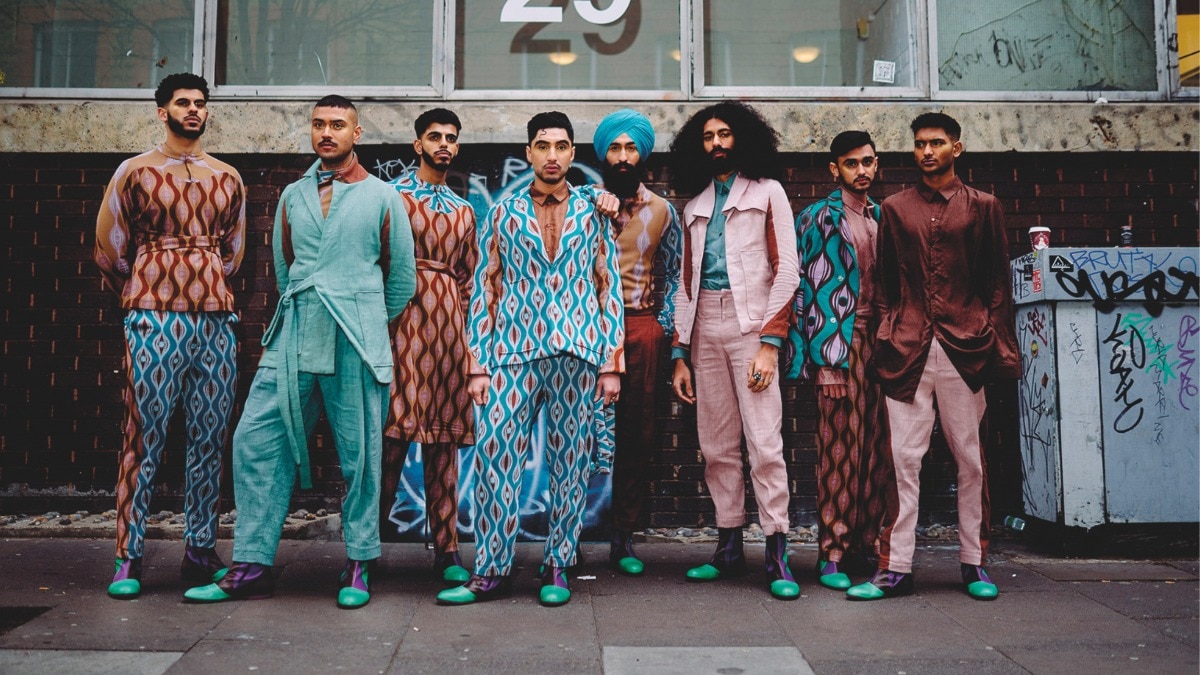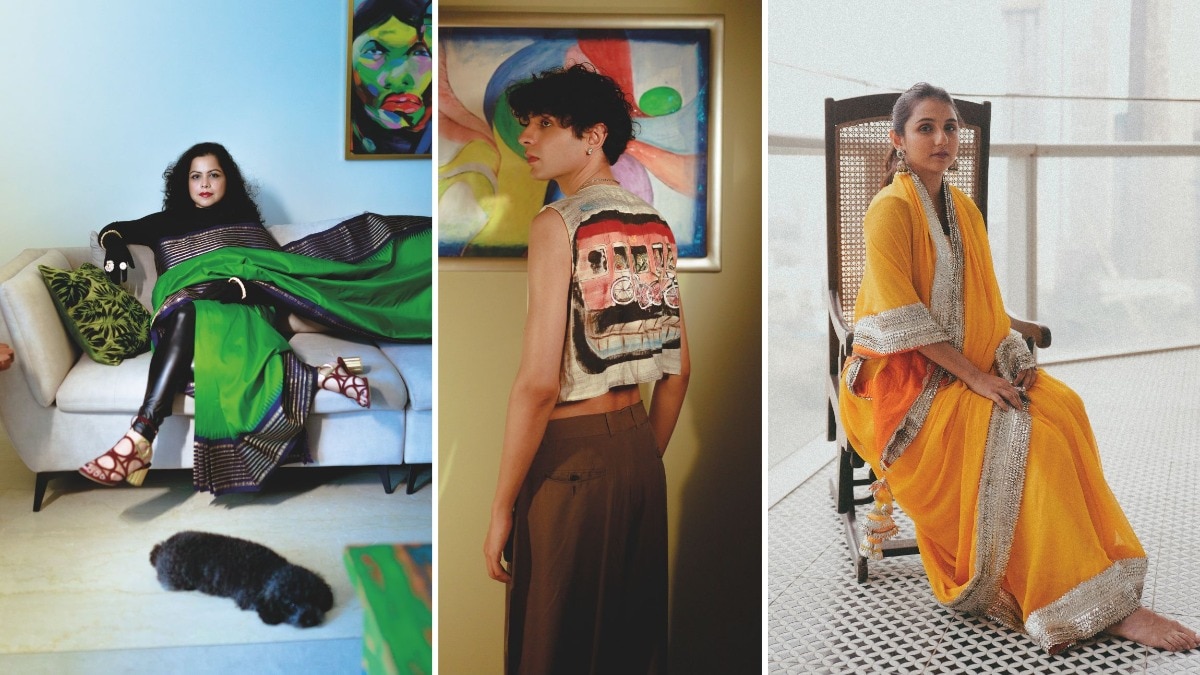
8 designers who are leading the change their fashion journeys
Fashion with a purpose!


Continuing our commitment to champion and spotlight fresh talent, we present eight inspiring brands leading change through their fashion journeys.
IRO IRO
BHAAVYA GOENKA, Designer

The visionary behind Iro Iro, Bhaavya Goenka, has crafted a fashion journey that’s both daring and delicate, staying true to her passion for sustainable craft and mindful design. Iro Iro was born from her childhood question: Why must clothing, so intimate to us, be destructive to the earth and its makers? While studying design at Indian Institute of Crafts & Design, she saw the vast waste in the textile industry, where discarded fabrics were often condemned to landfills. Determined to redefine this cycle, Goenka launched Iro Iro as a beacon of change.
Iro Iro’s collections are crafted from upcycled textiles, challenging conventional fashion norms with a philosophy of circularity and a deep respect for Indigenous practices. Each piece breathes new life into discarded fabrics, offering conscious consumers a sophisticated, sustainable wardrobe. Central to Goenka’s vision is “decolonising fashion” by honouring indigenous knowledge and dismantling Western-centric design narratives. With a decentralised model, Iro Iro supports village artisans, preserving traditional skills and creating livelihoods in their native communities.
NAUSHAD ALI
NAUSHAD ALI, Designer

Raised in Tamil Nadu amidst a legacy of textile craftsmanship, Naushad Ali grew up with an innate passion for design. Drawing inspiration from his father’s connection to the textile industry, he aspired to fuse India’s cultural heritage with global fashion sensibilities. This ambition came to life in 2015 with the launch of his eponymous label that blends traditional Indian crafts with modern aesthetics. His creations are crafted by artisans across India, revitalising ancient weaving techniques.“I want someone to wear a jamdani in NewYork and a catch weave in Paris,” Ali says, underscoring his goal to bridge local craftsmanship with global appeal. Sustainability emerged naturally, driven by a respect for artisanship rather than a commercial angle.“We wanted everything to be handmade, well-made, and transparent,” he reflects, emphasising his dedication to ethical creation. Looking ahead, Ali envisions a future where technology enhances tradition, and innovation and sustainability walk hand in hand.
ROSANI
ROHITASH NOTANI, Founder and Creative Director

Rohitash Notani describes his relationship with fashion as a “lifelong romance”. Launching ROSANI in 2023, he says it “was born out of my lived experiences—a blend of constraint and consequential rebellion”. Challenging traditional masculinity, Notani aims to celebrate individuality through design. “I design with the simple, yet powerful, intent of beauty—one that celebrates our differences without using gender as a limitation for how we dress our bodies,” he explains. Notani’s design ethos is influenced by the places he has lived and the people he has known.“It began at home,” he shares, reflecting on the graceful boldness of his grandmother and mother. Moving to Italy, he honed his skills in tailoring, learning “the beauty of precision” and embracing timelessness in design. Berlin, on the other hand, taught him fearlessness.“It’s here that I learned how powerful it can be when we all show up as our most authentic selves,” he adds. Echoing slow fashion, most of ROSANI’s pieces are made-to-order. Looking ahead, he envisions continuous refinement, creative collaborations, and a deeper connection with a community that values freedom and individuality.
SALDON 2112
PADMA SALDON, Designer

Padma Saldon’s journey in fashion is rooted in“authenticity and purpose”.Growing up in Leh, she was deeply influenced by the region’s landscape, traditional garments, and the slow, intentional lifestyle.“These early experiences made me realise that fashion could be more than just fabric and fit—it could be a means of storytelling, a reflection of heritage,” she shares. Inspired by artisans who “wove narratives into every piece they created,” Padma sought to blend traditional craftsmanship with modern fashion. Collaborating with artisans from Phyang village and Leh, she blends their traditional techniques with contemporary silhouettes to create designs that are both timeless and modern. “It’s important to ensure these traditions don’t get lost but evolve in a way that thrives in today’s global fashion landscape,” she says. Despite the industry’s fast pace, Padma embraces the challenge.“I prioritise ethical production and sustainability in every aspect of my work. It’s about balancing heritage with contemporary innovation,” she says, adding that every piece is sustainably sourced and crafted with intention.
SHRIYA KHANNA
SHRIYA KHANNA, Creative Director and Founder

Hailing from Coimbatore, Shriya Khanna is a Punjabi designer influenced by Southern simplicity and culture. As a child, she often acted as a personal shopper for her family, cultivating a love for dressing up and a clear sense of style. Frustrated by the lack of clothes matching her vision, Khanna decided to pursue fashion seriously. A graduate of NIFT Chennai and FIT NewYork, she has a deep appreciation for traditional techniques like handwoven fabrics and embroidery, yet she values technology’s role in refining design.“Digitally cut fabrics allow for precise, intricate cutwork that adds a refined, modern touch,” she explains. Art has inspired her to experiment with unconventional materials and textures.“Our collections often draw from artists like Peter Collingwood and Daphne Lee,” Khanna shares. Having started her label during the pandemic, Khanna recalls the challenges.“I flew two artisans from Delhi and set up a workspace in my granddad’s office.” Now, she aspires to expand, saying, “My goal is to open a flagship store in Delhi and venture into home décor.”
MARGN
RANJIT YADAV & SAURABH MAURYA, Designers

The authenticity of life’s everyday moments shaped RanjitYadav and Saurabh Maurya’s connection to heritage and craftsmanship. Ranjit grew up in Bihar while Saurabh’s early years were spent in Singrauli (Madhya Pradesh). Ranjit and Saurabh didn’t grow up around fashion runways, but in a world where tradition and resourcefulness reigned. Together, they launched Margn in 2021, a brand rooted in the philosophy of protection—cultural, personal, and environmental—by blending traditional Indian craftsmanship with modern functionality. Margn’s designs embody this spirit, pairing ancient Sujani quilting with water-repellent outerwear crafted from recycled materials. Starting without formal exposure to the fashion industry, Ranjit and Saurabh learned through experience, overcoming challenges in production, resources, and mentorship. Margn’s journey is just beginning, driven by a vision that balances local roots with global ambition. As it expands, it seeks to preserve South Asian craftsmanship while embracing international aesthetics, shaping a narrative that unites traditions with the modern world.
SWGT
SHWETA GUPTA, Founder

SWGT—an acronym for Seeker, Wanderer, Gatherer, Thinker—has its roots in Almora, where Shweta Gupta grew up surrounded by the Himalayas’ raw beauty. “That connection to the land and the stories I grew up hearing have been woven into the fabric of SWGT’s aesthetics,” she says. The brand blends the elegance of nature with wearable art, taking inspiration from everyday elements like ancient rocks, waterfalls, and foliage to create collections that celebrate subtle beauty. At its core, SWGT aims to create luxurious, timeless pieces with a focus on craftsmanship.“We are a skill-forward brand, merging Indian handlooms with a modern aesthetic,” the NIFT Gandhinagar graduate explains. The Delhi studio is not just a design hub, but also a centre for training and empowering women through unique techniques like quilting. However, educating customers about the value of handwoven textiles in a mass-market world remains a challenge. Looking ahead, Gupta aims to expand globally while staying true to SWGT’s commitment to mindful and sustainable luxury.
ZERO TOLERANCE
PRAKHAR RAO, Designer

Zero Tolerance, a brand that is as much a tribute to South Asian craftsmanship as it is a forward-thinking player in the global fashion narrative, is the progeny of Lucknow-born Prakhar Rao, who has carved his own path in the fashion industry with a vision that transcends mere aesthetics. Rao always found himself fascinated by the textures of handloom fabrics and the understated elegance of traditional Indian garments, and his passion for storytelling found its true medium in fashion. “It’s about representing who we are, our history, and creating pieces that transcend time,” he explains. Each garment, crafted from organic cotton or banana fibres, celebrates artisans whose crafts are fading, embodying authenticity, sustainability, and brown excellence. What’s next for ZT? Zero Tolerance leading a fashion revolution—one that leaves no carbon footprint, says Rao. He aims to bridge the gap between artisan and consumer, weaving the allure of South Asian craftsmanship into the very fabric of global fashion.“The future is rooted in heritage, but built with innovation,” he concludes.
All images: The brands
This piece originally appeared in the October-November print edition of Harper's Bazaar India.
Also read: Seven fashion stalwarts show us one thing in their closet that has lived through generations
Also read: Here's everything you need to create the perfect preppy look










